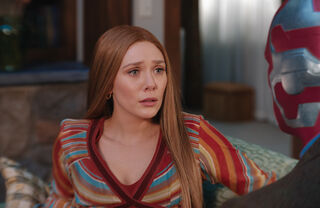Grief
What Grief Counselors Can Learn From WandaVision
A superhero confronts grief.
Posted February 5, 2021 Reviewed by Ekua Hagan

With the recent release of the Marvel Cinematic Universe (MCU) Disney+ television series WandaVision (Shakman, 2021), I once again turn to Dr. Jill A. Harrington, creator and lead editor of the new textbook, published by Routledge, Superhero Grief: The Transformative Power of Loss to help answer the question, “What lessons in spousal/partner bereavement can grief counselors learn from WandaVision?"
Dr. Marilyn Mendoza: WandaVision’s popularity has spurred conversations around a proposed central storyline of the death of Wanda Maximoff’s love, Vision, and the ensuing intense grief she is experiencing in the aftermath of his tragic death. What can you tell us about this character that may help grief counselors better understand partner/spousal bereavement, particularly the newly bereaved?
Dr. Jill A. Harrington: The first and most important lesson we can garner, as grief counselors, from the emerging story of Wanda Maximoff (aka Scarlet Witch), in WandaVision is the importance of assessing a client’s loss history. Wanda in the recent MCU films has experienced multiple sudden, traumatic deaths of loved ones before emerging as one of the most powerful Avengers. At this point in the MCU timeline, throughout her cinematic lifespan, Wanda has suffered the violent death of her parents in a bombing—instantly ripping her and her twin brother, Pietro (aka Quicksilver) from a secure, parental relationship—destabilizing their sense of security and trust—confronted to reconstruct themselves in an unknown world and find a new sense of meaning. Wanda and Pietro find that sense of security, as twins, even more now since their parents’ tragic death, within their affectional sibling bond; they become each other’s safe base (van Wielink, Wilhelm & van Geelen-Merks, 2020), or anchor, in a distrustful, oftentimes scary new world.
Their vulnerability, caused by a broken wound of love lost, and their natural feelings of insecurity from the sudden detachment of their secure parental attachment leave them susceptible to Ultron’s manipulation (Whedon, 2015). However, after the death of her brother, in the Battle for Sokovia, Wanda is even further tragically and significantly bereaved. We only need to understand the force cumulative, traumatic death bears on a broken heart at the moment she clasps her chest when her brother is killed in Age of Ultron, fighting with the Avengers against the domination of Ultron (Whedon, 2015). Profound loss, by tragic death, can scathe us—emotionally as well as physically. Understanding a client’s loss and grief history helps the counselor understand how much, where, and what influence loss has in their life and what may be needed to grieve these losses in an important step to restore balance to an unbalanced, strange new world.
Dr. Marilyn Mendoza: When we are looking at strengths or protective factors, what can we learn from Wanda?
JH: Wanda’s history is traumatic, painful, and tragic. What makes her exceptional is that within her tragic origin story, at a point where her grief forces her to make decisions on how to start a new beginning because of an end, Wanda emerges as one of the most powerful superheroes—because all the conditions set her up to be vulnerable to being the villain. To succumb, as well as embolden, a continued embittered path, however, because so much of her origins are bonded in love—grief becomes both the source of her strength and vulnerability. Leaning on love, while feeling scared and vulnerable, Wanda connects with her deepest of strengths and ultimately her transformation into a superhero fighting for the good of others while being significantly bereaved. We learn from Wanda that she is one of the most powerful superheroes because, despite the intense pain that loss can inflict, she is willing to allow herself to be vulnerable to love. The strength to allow oneself to become attached to someone, in this case, Vision, again after the immense pain of such significant, cumulative losses—these are superpowers—validate them. Understanding your client’s loss history, being knowledgeable about the physical effects of traumatic loss as well as understanding the significance of Wanda's openness to accepting the risks of new attachment and love, which ultimately, and inevitability will bear the pain of loss, speaks to her strength. It takes courage for a widowed partner/spouse to open themselves up to the potential of devastating loss again after experiencing the impact of the “third rail” of traumatic grief. Recognize and acknowledge this strength is one of life’s greatest adversities.
Dr. Marilyn Mendoza: In WandaVision, it appears that Wanda may be creating an altered-reality. What parallels can you observe from this and the experiences of bereaved widowed partners/spouses?
JH: First of all, if you have ever spoken to a person who has lost a loved partner or spouse, most commonly, they will tell you how they feel after their loss that they are living in an “altered-reality.” People we love, especially our partners and/or spouses, bring meaning to our world. They connect us to our reality. They help anchor us as well as become part of our role and identity. Skipping universes, Superman tells us this as he refers to Lois as his world. It is important for grief counselors to understand that when a partner or spouse dies, a person's everyday reality is shifted. The world can seem like a strange and scary place, in which one feels the need to control everything around them—to protect themselves. To feel a sense of control around all that is out of control. When a loved partner/spouse dies, our entire world changes. Even though death is universal to humankind, the loss of a loved one is still the most distressing of all our life experiences. Providing empathy, validating that sense of altered reality, and helping a bereaved spouse/partner regain a perceived sense of control amidst the uncontrollable is one of the most paramount and powerful roles of the grief counselor.
Dr. Marilyn Mendoza: What are secondary losses and what can we learn (so far) from WandaVision about widowed partners/spouses?
JH: The death of a loved one is a primary loss. Secondary losses are a rippling effect from a primary loss. Most bereaved spouses/partners don't understand it until they are living through it, and a vast majority of society does not “get it” or enfranchise these losses. They are both tangible and intangible losses, such as loss of a home, loss of identity, loss of a sense of security, loss of companionship, loss of customs and habits, loss of trust, loss of a family role, loss of financial security, loss of purpose, loss of confidence, loss of intimacy as well as the loss of future hopes and dreams. Developmentally, widowed partners/spouses experience challenges and stressors that vary at the age and time of development when they lose a partner/spouse. When a partner/spouse dies at a younger age, some of the losses suffered by the bereaved partner/spouse are those of future hopes and dreams, which may include being married, having a home, starting a family, and establishing oneself in a career and community. All illuminated in the WandaVision story. There is also a gap in the bereavement research literature regarding the grief experiences of women who are pregnant when their partner/spouse dies as well as younger widowed persons with children. It can be frightening to face this new assumptive world, one in which bereaved widowed spouses/partners may need to protect themselves with a perceived sense of a controlled reality around them in order to survive their decimating, compounding grief. So, it is important to understand from observational experiences that the journey of young widowhood comes with unique challenges—one that also involves grieving secondary and future losses.
Dr. Marilyn Mendoza: What teachable moments, so far in the WandaVision timeline, are there for grief counselors and those who want to support widowed partners/spouses?
JH: There are so many, let me try and summarize a few key observations:
- Understand your client’s loss history and the impact profound grief can toll both emotionally and physically, especially on the newly and suddenly bereaved. Work holistically and encourage medical follow-up.
- Given that most superheroes exemplify the ability to transform their own grief into something meaningful—provide validation and support to clients who embrace their grief superpowers to survive such devastation and strive to find some semblance of positive meaning and purpose in their lives again.
- Don’t rush to judge and especially do not subscribe to a linear, non-multicultural path with grief. There seems to be so much judgment around Wanda’s “aberrant” or “villainous” grief—her perceived narcissistic preoccupation with the loss of her beloved Vision. When we are deprived of what gives us oxygen, such as the love of a partner, all we can focus on is how to survive without what is essential for us to breathe. We need to sometimes put ourselves in a protective bubble—like an oxygen tank. Grief is not our villain—it is our fight to manage the pain of love and loss. How we emerge from it determines whether it becomes a villain to ourselves and/or others—this is the path of our own metamorphosis, transformation—our fight for life and breath. Widowed partners/spouses are some of the most judged in society. This dates back to rituals and customs where social norms expected the widowed to grieve in a certain way, and anything outside that margin was considered open for social ridicule. Grief is a natural response to loss; it is important to understand that the confusing, multiple emotions of grief can make one, especially in the first days, weeks, months, and several years, feel like they are "going crazy.” The bereaved judge themselves as harshly as society—encourage self-compassion and building protective skills against unempathetic foes.
- There can be dangerous responses to grief, such as destructive and self-destructive behaviors, failure to thrive, suicidality—this can be especially prevalent when there is trauma involved. The severed attachment from a bereaved partner/spouse is one of life’s most distressing experiences. For this reason, bereavement should be considered as a concern not only for preventative care but also clinical practice. Clinicians should continually assess for both passive and active self-harm and suicidality.
- There are unique challenges that accompany widowed partners/spouses. Challenges that may involve bearing and raising children as “only parents,” feeling as if the death of their partner/spouse has altered their reality (living in a bubble while the world exists around them), feeling judged by others, and trying so hard to hold on to the Vision of their hopes and dreams with their loved partner/spouses while being confronted by the all too powerful reality of their loss—like, Wanda, wanting to push it away.
- Wanda teaches us that we can be both powerful and fragile. It takes strength to fight to survive the profound pain of grief. She also shows us that there is courage in allowing oneself to be open to love and the pain of loss amidst a lifetime of profound loss. And that as counselors (or friends and family) the need to be supportive, empathetic, grief-informed, and compassionate in an effort to provide a safe environment for a person who feels the world is an altered, unsafe place. To be that safe holding environment as well as the supportive and caring voice—reaching out through our radios to ask, "Wanda. Wanda, can you read me, over?" (Shakman, 2021, 15:36).
Dr. Jill A. Harrington is the creator and lead editor of the novel, new and creative textbook, Superhero Grief: The Transformative Power of Loss. Dr. Harrington is also a clinical social worker, specializing in the intersection of grief, loss, and trauma as well as an adjunct assistant professor at The Chicago School of Professional Psychology, part-time Lecturer at Rutgers University School of Social Work, and graduate of the University of Pennsylvania School of Social Policy & Practice who also maintains a private practice in the Greater Washington, D.C. area.
References
Shakman, M. (Director) (2021). WandaVision [Television]. Marvel Studios.
van Wielink, J., Wilhelm, L., & van Geelen-Merks, D. (2020). Loss, grief, and attachment in life transitions: A clinician’s guide to secure base counseling. Routledge.
Whedon, J. (Director). (2015). Avengers: Age of Ultron [Motion Picture]. Marvel Studios.


